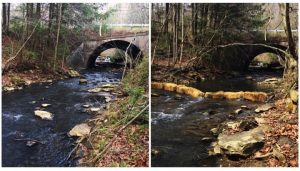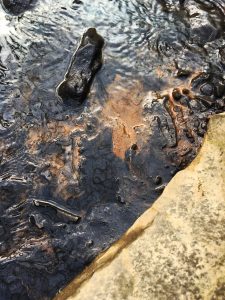On March 23, the Admiral Processing Plant in Boone County, W.Va., leaked approximately 5,400 gallons of coal slurry into Crooked Run, a tributary of the Coal River. The plant has been operated by Black Castle Mining Company since November 2015 and is affiliated with Alpha Natural Resources. The spill resulted from a broken pipe at the facility, much like the Kanawha Eagle Processing Plant spill just north in Kanawha County in 2014.
The spill occurred 17 miles upstream from Lincoln County’s municipal water intake and 35 miles upstream from the St. Albans intake, both located on the Coal River. A second spill of unknown quantity occurred during cleanup operations on March 24, when a pump being used to move contaminated water failed. In response to the spills, the West Virginia Department of Environmental Protection issued a Notice of Violation, for the company’s “failure to minimize the disturbance to the hydrologic balance.”
Footage courtesy of Kanawha Forest Coalition
Appalachian Voices and Ohio Valley Environmental Coalition staff responded to the spill by collecting water samples and documenting its impact. The facility has a Clean Water Act permit that sets limits on common coal mining pollutants that the plant can release into waterways, which is standard for mines and processing plants. The Admiral Processing Plant permit limits the discharge of iron, manganese, aluminum and total suspended solids.
Spill samples collected by citizen groups were analyzed by two independent, certified laboratories. According to the test results, the spill violated the plant’s daily maximum discharge limit for all four pollutants. The spill also resulted in the discharge of arsenic, beryllium and lead into the stream. While levels of these pollutants were fairly low, all are known to have negative impacts on human health.
The company was able to stop the main spill after about three hours, but not before, the coal slurry spread from the initial tributary, Crooked Run, into Drawdy Creek and all the way to Coal River, approximately 1.5 miles downstream. The coal company did not install any sediment control structures until about 24 hours after the spill occurred.

Before and after photos taken on March 24 showing the installation of hay bales to prevent solid particles from the coal slurry from moving further downstream in Drawdy Creek. These steps were not taken until almost 24 hours after the spill.
We do not yet know how much the Department of Environmental Protection will fine the company. In instances like this, fines should be large enough that companies invest the time and money necessary to prevent further spills rather than just paying for fines and cleanup costs after the fact. Slurry spills continue to be a common occurrence in southern West Virginia and other Central Appalachian states, demonstrating the need for stronger state and federal oversight to protect public water and the communities that depend on it.




No more fishing for trout at Drawdy Falls. The coal industry seen to that. I hope James Post who lives very near the falls is okay.